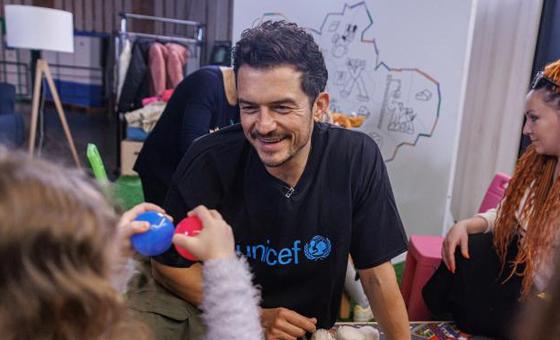Some 13 months of often brutal fighting and attacks on civilians since Russia’s large-scale invasion of Ukraine began, have left millions displaced, with key civilian infrastructure in need of urgent protection.
Ensuring nuclear safety
Touring the area around Zaporizhzhya Nuclear Power Plant, Rafael Mariano Grossi, head of the International Atomic Energy Agency (IAEA) met with President Volodymyr Zelenskyy in the nearby city of the same name, to discuss ongoing threats.
Assessing the serious nuclear safety and security situation, Mr. Grossi underlined the urgent need to protect the power plant during the ongoing military conflict in the country.
IAEA teams are rotating in and out of the plant, which remains under the control of Russian forces.
“Despite our presence at the site for seven months now, the situation at the Zaporizhzhya Nuclear Power Plant is still precarious,” he said.
The nuclear safety and security dangers are all too obvious, he cautioned.
It is necessary “to act now to prevent an accident with potential radiological consequences to the health and the environment for people in Ukraine and beyond”, he stressed.
Mr. Grossi said his travel to Ukraine was also aimed at ensuring the regular rotation of IAEA experts to and from the site is maintained and improved, following the very challenging circumstances faced by the experts during the previous rotation in February, which had been delayed by almost a month.
During the current visit, he was accompanied by a new group of IAEA experts, the seventh such team present at the site since the IAEA Support and Assistance Mission to Zaporizhzhya was established.
Mr. Grossi and Mr. Zelenskyy also visited the Dnieper hydroelectric station, which is an essential component for nuclear safety at the Zaporizhzhya plant.
“I remain determined to continue doing everything in my power to help reduce the risk of a nuclear accident during the tragic war in Ukraine,” Mr. Grossi said.

IAEA Director-General Rafael Mariano Grossi meets Ukraine’s President Volodymyr Zelenskyy in Zaporizhzhia, Ukraine on 27 March 2023.
Bomb-shelter classrooms
Since February 2022, thousands of schools have reportedly been severely damaged or destroyed by bombing and shelling, leaving almost 2.7 million Ukrainian children accessing learning online or through hybrid modalities, the UN Children’s Fund (UNICEF) has said.
Concluding a three-day visit to Kyiv, Irpin, and Demydiv, Hollywood star and UNICEF Goodwill Ambassador Mr. Bloom said education can and must be an anchor to children in a time of war, where an estimated 1.5 million children in Ukraine are at risk of depression, anxiety, and other mental health conditions, with long-term implications.
“Amid the chaos and uncertainty of war, supporting children’s education is an essential tool in protecting their long-term mental health and wellbeing,” he said. “Above all, children need an end to this war and sustained peace to regain their childhoods, return to normalcy and begin to heal and recover.”
In Irpin, a town heavily impacted by the early days of the fighting, he visited a bomb-shelter classroom, converted with UNICEF support, to provide a safe space for children to continue learning when air-raid sirens may sound.
Safe spaces
“Some of the children I have met, such as 10-year-old Hanna from Volnovakha, Donetsk region, have had limited access to face-to-face education for more than a year,” Mr. Bloom said.
At UNICEF’s Spilno Child Spots in Irpin and Kyiv, Mr. Bloom saw children play and learn. They can also benefit from psychosocial support, medical checks, and referrals to specialized services. He also met with President Zelenskyy to discuss educational challenges amidst the conflict.
“While UNICEF is helping ensure that children are able to learn online, they are still missing out on the crucial experience of interacting with their classmates and teachers,” Mr. Bloom said. “Especially for younger children, these interactions are key for their emotional and cognitive development and cannot be replaced by a computer screen.”

UNICEF Goodwill Ambassador Orlando Bloom meets children affected by the war in Ukraine.
Growing needs
In 2022, over 500,000 children and their caregivers visited 180 Spilno Spots across Ukraine. Over the past year, UNICEF has provided education, health, nutrition, water and sanitation, and protection assistance to children and families affected by the war, including efforts in countries hosting refugees from Ukraine.
UNICEF continues delivering for children inside Ukraine and in neighbouring countries and requires $1.05 billion to meet the growing needs of 9.4 million people, including 4 million children, who remain deeply impacted by the war.
Security Council rejects fresh action on pipeline explosions
On Monday, the UN Security Council rejected a draft resolution that would have authorized an international independent investigation commission into the explosions in September last year, of the Russian-operated Nord Stream gas pipelines.
Brazil, China, and Russia voted for the draft, with none voting against it, and 12 Council members cast abstentions.
The two Nord Stream pipelines built to carry natural gas from Russia to Europe under the Baltic Sea, sustained millions of dollars in damages from the blasts. National investigations have yet to yield any conclusive evidence into how the explosions occurred.
Nord Stream I carried gas to Germany from Russia until Moscow cut off supplies last August, while the second pipeline never became operational, after Germany suspended it’s involvement in the service just before Russia’s invasion of Ukraine.
The Council had debated the issue in February, noting that investigations are ongoing by governments in the region.

